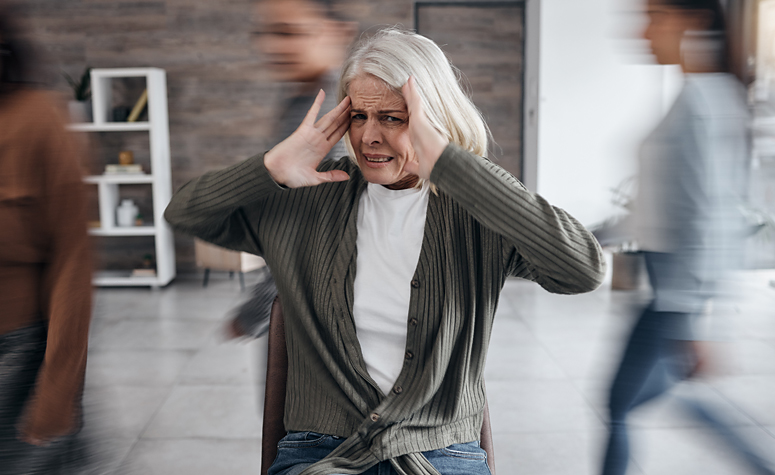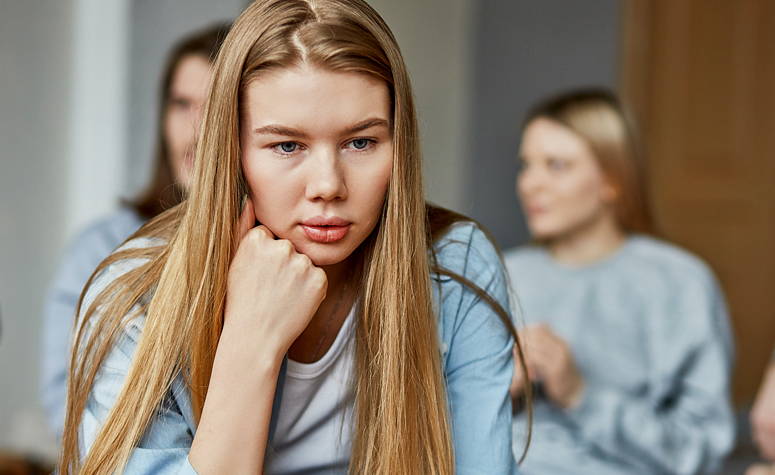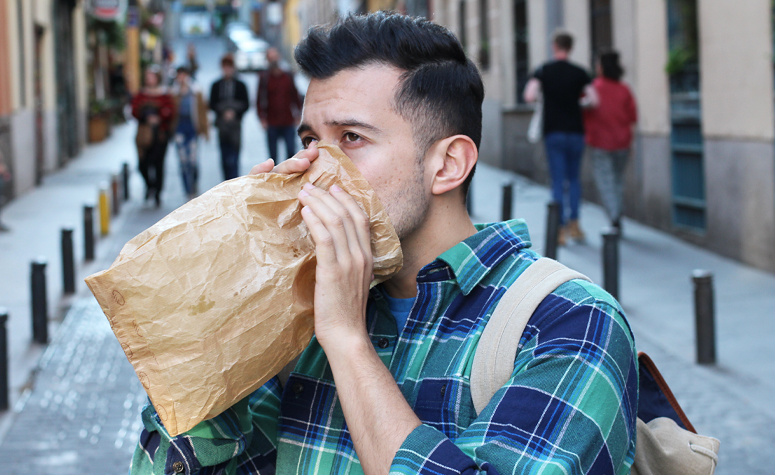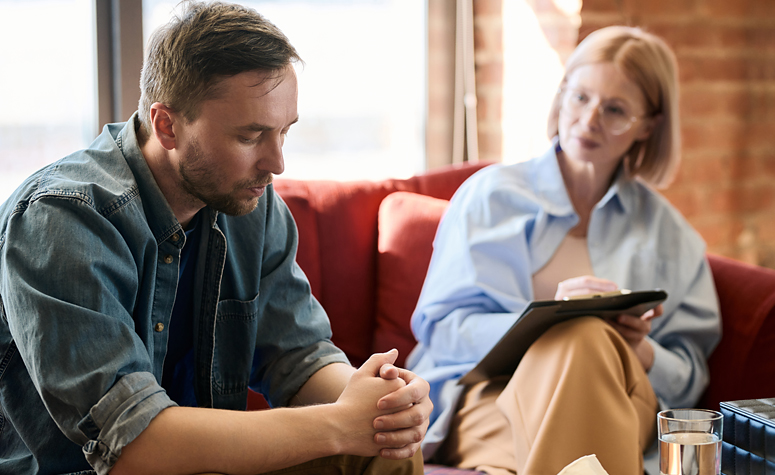Social Anxiety Disorder:
Symptoms, Causes and Treatment
Social anxiety, or “social phobia”, is a type of anxiety that people experience when they are in social settings, thus potentially having an adverse effect on their lives and relationships with others.
On this page we we’ll examine the condition in closer detail – its causes, symptoms, and how to overcome it. We’ll also look at the treatment options available to help you get back your life back on track.

What is Social Anxiety
Social anxiety disorder is characterised by the intense feeling of distress individuals experience in social settings or in situations when they are interacting with or being observed by others.
While it’s normal to feel nervous when we’re meeting new people or giving a speech, individuals with this disorder experience excessively high distress and disproportionate to the actual situation. They are often convinced that they will experience humiliation in front of people or be judged by others to the extent that they may completely shun social situations. While some people with this condition may recognise that their fear of social situations is irrational, they are unable to control their anxiety as these feelings seem so real to them.
Social anxiety is triggered by many different situations, and these can vary among individuals. These triggers can include the following:
- Meeting new people
- Speaking in front of a group
- Talking in front of strangers
- Eating in front of other people
- Dating
- Using a public toilet
- Entering a room on your own
- Going to parties
- Initiating conversations
Social anxiety disorder can be crippling to suffers and can significantly affect an individual’s ability to:
- Go to work or school – find out more about social anxiety at school
- Talk to anyone outside their family
- Develop relationships and friendships
- Engage in routine, day-to-day tasks such as food shopping

What Causes Social Anxiety?
Just like other types of anxiety, it’s likely that there isn’t a singular cause for social anxiety. It’s widely accepted that a combination of genetic, environmental and social factors influences one’s likelihood of developing social anxiety. These include:
- Having a close family member struggling with social anxiety
- Experiencing abuse and/or neglect, especially if this happens during childhood
- Being in stressful situations such as family conflict
- Being the victim of bullying or rejection

Sometimes the smallest step in the right direction
ends up being the biggest step of your life
Tiptoe if you must, but take the step
What are the Symptoms of Social Anxiety?
Anxiety can manifest itself in various ways, and symptoms may differ among individuals. There are both psychological and physical symptoms, and if you think you might be suffering from anxiety, here are the major signs and symptoms to look for:
Psychological symptoms
- Excessive fear and discomfort when you’re in a social situation
- Feeling extremely self-conscious in front of other people
- Worrying about an upcoming social event for weeks and playing it over and over in your mind afterwards
- Experiencing difficulty speaking in front of other people or feeling like your mind has “gone blank”
- Avoiding social situations as much as possible, which can subsequently lead to isolation and loneliness
- Convinced in your mind that you’re going to be humiliated or embarrassed in front of other people
- Thinking that other people are looking at you and judging you. Suffers of social anxiety often talk about feeling like there’s a giant spotlight fixed on them that draws people’s attention
- Worrying that other people will sense your distress and that you feel uncomfortable around them
- Being absent from work or school due to anxiety
- Feeling that you need to drink alcohol to have the courage to face a social event
- Having low self-esteem and being very sensitive to criticism
Physical symptoms
- Rapid heartbeat
- Rapid breathing
- Sweating
- Nausea and diarrhoea
- Blushing
- Dizziness and lightheadedness
- Trembling and shaking
- Panic attacks
Not everyone with social anxiety experiences all of the symptoms mentioned in all social situations. Some may only experience social anxiety during specific types of interaction, such as eating in front of other people or talking to strangers. However, in cases of severe social anxiety, all these symptoms can potentially be experienced in any situation where there are other people present.

How to Cope with Social Anxiety?
Managing anxiety might seem overwhelming, but there are a variety of practical things you can do that can help to alleviate it.
- Talk to a trusted friend or family member about how you’re feeling
By sharing your struggle with social anxiety with others, they’ll be able to sense when you might be feeling distressed, understand its triggers, and provide better support for you.
- Take time out for yourself
You must set aside some time daily to engage in an activity you enjoy or find relaxing, such as going for a walk, soaking in a hot bath or listening to your favourite music. These kinds of activities can uplift your mood and release “feel good” chemicals in the brain, reducing feelings of anxiety. Engaging in these mood-enhancing activities can be helpful, especially if you do them just before a social situation that is causing you to worry. This practice allows you to shift into a positive mindset, making the situation less daunting.
- Practice relaxation and breathing techniques
When you’re feeling anxious, try breathing in deeply and holding it for a few seconds, then breathing out slowly. Doing this several times can help manage the “fight or flight” response and help your body to calm down to a more natural resting state. You can also consider learning relaxation techniques like meditation or joining a yoga class. If you feel uncomfortable doing these activities in person, many other online resources are available, and you may even join some classes remotely.
- Take steps to re-frame your thoughts
Avoiding social situations altogether may bring temporary relief to your anxiety; however, it can make the problem worse in the long run. Try putting yourself in a social situation that triggers anxiety and see if any of the things you’re worried about actually happen (such as being humiliated in front of other people). Chances are they won’t, and you can use this experience to re-frame your thinking about such situations. Consider asking a friend or family member to accompany you and give you moral support.
- Look after yourself
Working on your physical health also helps in improving your mental wellbeing. Steer clear of caffeine and alcohol as these can worsen your anxiety symptoms, get plenty of sleep every night (go for 7 – 8 hours), maintain a healthy diet and stay hydrated. Feeling good physically is proven to positively affect your mood and diminishes the symptoms of anxiety.
Following the tips above can greatly enhance your coping skills with social anxiety. However, it’s important to recognise that complete healing from this disorder may require professional treatment from a mental health specialist.

Social Anxiety Treatment
You may find it intimidating to seek professional help, but initiating your recovery is crucial in order to move forwards. Anxiety treatment typically involves two primary components: therapy and medication.
Therapy
There are various therapies used to treat social anxiety, the most effective being cognitive behavioural therapy (CBT). CBT for anxiety motivates you to challenge negative thoughts and beliefs about social situations and replace them with positive alternatives. This can significantly reduce your fears surrounding social situations, giving you a healthier and more positive perspective on social settings.
Exposure therapy, including exposure response prevention (ERP), is another effective method used in treating social anxiety. This therapy involves systematic and gradual exposure to social situations that trigger your anxiety, with your therapist guiding you through carefully graded steps. While these situations may initially cause anxiety, with time, it will eventually subside as you begin to realise that nothing negative is happening and your fears are unfounded.
Emotional regulation and anxiety management work are additional treatments for social anxiety. These techniques help you calm down and manage your anxious thoughts before you enter a social situation.
Another form of treatment for social anxiety is emotional regulation and anxiety management work. These techniques help calm your anxious thoughts before you enter a social situation.
Medication
Another effective method to treat social anxiety is through the use of prescribed medications. Selective serotonin uptake inhibitors (SSRIs) have antidepressant properties and are the most commonly prescribed anxiety medications. When taken alongside therapy, they can be highly effective because they provide additional protection from your social anxiety symptoms. Other examples of medications that may be prescribed for anxiety are beta-blockers and Anxiolytics.
FREE Anxiety Assessment
If you or a loved one are struggling with anxiety, there is hope and a solution for you. You can receive treatment as an outpatient or inpatient and through one-on-one or support group therapy. We understand the challenges you’re facing and we’re here to offer compassionate help and support.
Our multidisciplinary team of experts have successfully treated thousands of people suffering from anxiety, helping them regain control of their lives.
We can present and explain the world-class treatment options we offer, discuss your problem with anxiety with you, assess your condition, and give you recommendations on the best and most appropriate next step you can take so you can regain control of your life.
Our highly trained advisers are available to speak to you right away, simply call 0808 252 3379 today.
We can discuss your concerns in complete confidence, explore the options for treatment, and help you to understand what will work best for you.
We’ll also help you to book your free anxiety assessment there and then, with appointments usually available within only a few days.
We understand that taking the first step can be the most difficult, but we’re here to offer support – with no pressure or judgement.
Professional and compassionate help is just a phone call or click away.




